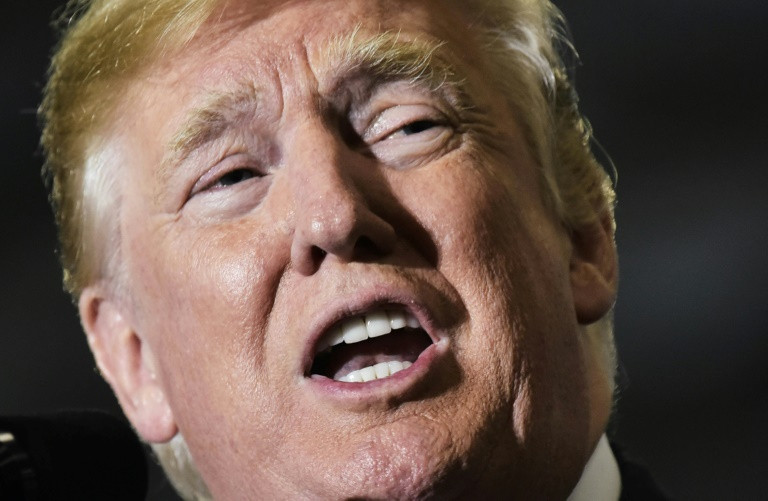
Donald Trump is preparing to meet with Kim Jong Un -- the first summit between a sitting US president and the leader of North Korea (Photo: AFP)
US President Donald Trump suggested Monday that his summit with North Korean leader Kim Jong Un be held in the truce village that straddles the border separating the two Koreas.
Trump revealed last week that two or three locations were under consideration for the historic summit -- which would be the first between a sitting US president and a leader of North Korea -- but this is the first time he has publicly named a potential site.
"Numerous countries are being considered for the MEETING, but would Peace House/Freedom House, on the Border of North & South Korea, be a more Representative, Important and Lasting site than a third party country? Just asking!" Trump tweeted.
Possible locations for the historic encounter reportedly include Singapore, Mongolia and Switzerland.
The Peace House in Panmunjom -- the village in the Demilitarized Zone where the 1953 armistice that halted the Korean War was signed -- was where Kim and South Korean President Moon Jae-in met Friday in a major step towards easing tension on the flashpoint peninsula.
Kim, the first North Korean leader to set foot in the South since the armistice, walked with Moon to the Peace House on the southern side of the border for their meeting.
Preparations for a Trump-Kim summit have gathered further momentum since Friday's summit, which saw North and South Korea promise to pursue the complete denuclearization of the peninsula and a permanent peace.
Seoul says North Korea has pledged to shut down its nuclear test site within weeks and invite American weapons experts to verify its closure.
Kim also told Moon the North would have no need for nuclear weapons if the United States promised not to invade it, South Korean officials said.
- High tensions to talks -
The planned Trump-Kim summit is a significant shift from last year, when Pyongyang carried out its sixth nuclear test, by far its most powerful to date, and test-launched missiles theoretically capable of reaching the US mainland.
Its actions sent tensions soaring as Kim and Trump traded personal insults and threats of war.
Trump has demanded the North give up its weapons, and Washington is pressing for it to do so in a complete, verifiable and irreversible way.
But Pyongyang views its nuclear arsenal as essential for the regime's survival, and would likely make security guarantees a condition of giving it up.
US Secretary of State Mike Pompeo told ABC's "This Week" on Sunday that the United States has an "obligation" to pursue the diplomatic track with North Korea, despite often-hawkish rhetoric from the Trump administration.
"We have an obligation to engage in diplomatic discourse to try and find a peaceful solution so that Americans aren't held at risk by Kim Jong Un and his nuclear arsenal," and there is a "real opportunity" for progress, said the incoming top diplomat.
The former CIA director also said he and Kim held in-depth talks about a denuclearization "mechanism" when they met over Easter weekend.
"We talked a great deal about what it might look like, what this complete, verifiable, irreversible mechanism might look like," Pompeo said.
US National Security Advisor John Bolton said on Fox News Sunday that Libya's decision to give up its nuclear program through diplomacy was a "model" for efforts to get North Korea to do likewise.
But Libya's move to scrap its nuclear program also serves as a model of what North Korea fears could happen: its government was later overthrown by rebel forces supported by Western air strikes in 2011.
Pyongyang regularly cites the fates of Saddam Hussein in Iraq -- whose government was toppled by a US-led invasion -- and Libya's Moamer Kadhafi, who was killed after his fall from power, as evidence of the need for nuclear arms.


